Main Menu
Latest Blog Entry
User login
Books of 2015
The best books of 2015
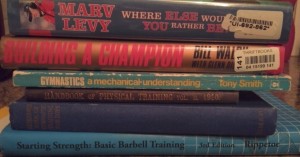
Just a few
I read many good books in 2015, plus a couple of great ones, I also discovered a fantastic bookshop in Beaumaris which helped rejuvenate my love of reading.
Here is a brief review of all the books read so far, plus top 5 overall.
The Top 5
In no particular order:
- The War the Infantry Knew, 1914-1919. Captain J.C.Dunn.
- Strength Training and Coordination an Integrative Approach: Frans Bosch.
- The Big Fat Surprise:Nina Teicholz.
- Round the Bend: Nevil Shute.
- Make it Stick: The science of successful learning. Peter Brown, Henry Roediger, Mark McDaniel.
The full list:
- Stronger Minds, Stronger Bodies: Randall Strossen. Excellent compilation of articles from Ironman magazine on how to train your mind. Aimed at strength type people, the 60 articles are emminently readable and applicable to all sports people.
- One Step Behind: Henning Mankell. Crime thriller featuring Kurt Wallender.
- From a Clear Blue Sky: Timothy Knatchbull. Account of the Mountbatten bomb attack and one survivor’s attempt to recover. Emotionally wrenching about life, death and the loss of a twin.
- Show Your Work: Austin Kleon. Lightweight very short book about sharing good work. World wide rave is much better.
- Das Kapital: Karl Marx. Heavy going economic classic from the 19th century. The last 200 pages were much easier reading and forecast a lot of the problems of inequality we are currently suffering from.
-
The Liberator: Alex Kershaw. World War II account of Felix Sparks who fought from Sicily through to Dachau. Very interesting, lots of brutal facts and hones truths portrayed, as well as the horrors of war.
- Eleven Rings: Phil Jackson + Hugh Delehanty. Excellent account of this very successful basketball coach’s championship wins. Lots of leadership and coaching ideas, including how he managed to coach dominant personalities.
- The Burning Room: Michael Connelly. Detective novel featuring Harry Bosch in possibly his last case with junior partner.
- The Drop: Michael Connelly. Detective novel featuring Harry Bosch and the politics of LAPD.
- Winning Ways: How to Succeed In The Gym and Out. Randall Strossen. Really good practical sports psychology book. Collection of 80 short but highly relevant articles about lifting weights.
-
The War the Infantry Knew, 1914-1919. Captain J.C.Dunn. Outstanding account of an infantry battalion in the first world war. Written by medical officer, but includes many first hand accounts from officers (Sassoon, Graves included) and men. A must read.
- King and Maxwell: David Baldacci. Short novel (but padded out with large print and spaces) about p.i.s investigating military cover up. Author getting lazy.
- The Education of a Coach: David Halberstam. Excellent biography of Bill Belichick up to 2005. Shows his background well, and how he became successful.
- Starting Strength: Mark Rippetoe. Excellent book detailing the mechanics and key coaching point so the squat, press, bench press, power clean, power snatch and deadlift. Definitely written with a “barbell is best” premise, so needs to be put in context. However, the drawings and explanations are really useful.
- Steven Erikson. The Lee’s of Laughter’s End. 3 novellas in one book, entertaining and well written fantasy.
- Affluenza: Oliver James. Interesting but overlong and self-indulgent view of the materialistic western societies. Good premise, written pre financial crisis, but way too many personal anecdotes and autobiography. 100 pages shorter and it would have been better.
- The Reversal: Michael Connelly. Procedural legal novel featuring Mickey Haller and Harry Bosch. OK, but not his best.
- Limbang Rebellion: Eileen Chanin. Account of 7 days insurgency in December 1962 in Brunei. Rescue mission by Royal Marines of local administrators.
- One Summer, America 1927: Bill Bryson. Self indulgent ramble about Babe Ruth, Charles Lindbergh et al. Got annoyed with one error, may be more.
- Gardens of the Moon: Steven Erikson. Huge fantasy novel that has very good bits. Too many characters, races and magic to keep up.
- Deadhouse Gates: Steven Erikson. Even longer fantasy novel, which has more characters and races. Was a chore to get through certain story lines, which had no relation to the rest!
- Where Else Would You Rather Be: Marv Levy. Real page turner of an autobiography by this excellent writer and coach. Lots of great anecdotes and reflections, very humorous, ideas on building and creating teams. Highly recommended.
- Leaders Eat Last: Simon Sinek. Useful look at what it means to be a leader. Anecdotal evidence from the US military, combined with hypothesis of baby boomers leading selfish generation.;
-
A Movement Approach to Educational Gymnastics: Ruth Morison. Must read for p.e. teachers who want to help young people move. Contains first “physical literacy” reference that I have seen.
- I am Legend: Richard Matheson. Classic SF novel about the last surviving human. Written in 1954, this is a well written, dramatic and bleak outlook of a post plague world.
- Enjoying Track and Field Sports: Ed Ann Kramer. Beginners guide to the nuts and bolts and rules of athletics.
- The Greatest Podcasting Tips in the World: Malcolm Boyden. Dated, but useful guide to setting up a good podcast.
- Gymnastics a Mechanical Understanding: Tony Smith. Excellent book highlighting key moves and how the mechanics underpin them. Very useful.
- Movement Efficiency for Developing Athletes: Kelvin Giles. Short book, but full of clear information and useful examples. Really should be part of physical educators toolbox.
- Blood on the Sand: Michael Jecks. Historical novel set in the 100yrs war. Immediately forgotten.
- The Science of Swimming: James E. Counsilman. Excellent book written by a very experienced swimming coach. I am no swimmer, but coach those who do. Insightful look at the technical and human side of coaching.
- Make it Stick: The science of successful learning. Peter Brown, Henry Roediger, Mark McDaniel. Interesting and well researched book about how people learn. Highly recommended for all coaches and teachers.
- Trustee From The Toolroom: Nevil Shute. Old novel about a man taken out of his comfort zone. Excellent diversion.
- Building a Champion: Bill Walsh. Autobiography of time around the 49ers. Some great reflections and insights.
- Why People Believe Weird Things :Michael Shermer. Excellent book on pseudoscience, skepticism and pseudo history. Busts some myths and explains why people stick to what they want to know.
- Creole Belle: James Lee Burke. Detective novel set in Louisiana with a political slant. Very enjoyable and shows the author is still working hard on his craft.
- The Second World War: Antony Beevor. Overview of the conflict, particularly critical of almost everybody in a leadership role except Stalin!
- Aspects of Science Fiction: Ed. G.D.Doherty. Collection of short stories from 1959 and an overview of different themes. Asimov, Alias, Wells included. Enjoyable.
- Nudge:Thaler & Sunstein.Libertarian Paternalism explained using choice architecture. Good premise and first 2/3rds. Repeats a bit at end.
- Black on Black: Chester Himes. Short stories and essays from the 1940s. Life in the USA for black people according to this angry writer. Riveting.
- Mastermind: How to think like Sherlock Holmes: M Konnikova. Interesting read about concentrating on the right things at the right time. Good use of Holmes stories to illustrate points, but I preferred “Thinking Fast and Slow” by Kahneman.
- Handbook of Physical Training Volume II. 1910, Royal Navy. Guide to organising recruits. Includes fencing, boxing, wrestling, joy jitsu and Indian Club swinging games.
- Understanding Voluntary Organisations: Charles Handy. Excellent read, well written, on different aspects of organisational culture. Useful to understand different motivations.
- The Weightlifting Book: Tamas Fever. Technical guide to the lifts in pdf dormat. Has some really good points, especially on technique and coaching attitudes. Downside is it is on pdf and the Hungarian system of using numbers instead of names for the exercises is very frustrating. Can’t keep going back/ forward on the pdf! Feher has some excellent coaching philosophies. One for purists only.
-
Weightlifting Programming: A Winning Coaches Guide: Bob Takano. Well written book, with a different perspective on how the body works, coming from his Biology teacher background. No technical points, but has a good system of programming for different categories of lifters. Well laid out.
- Reference Book of Gymnastic Training for Boys: Board of Education (1947). Excellent resource on how to create a comprehensive school gymnastic programme. A very dry read, and hard to follow some of the abbreviations at points. Based on old Swedish p.t. exercises and uses drill commands a lot,have used lots of ideas in our school class.
- Round the Bend: Nevil Shute. Fantastic page turning novel about aircraft company set in post WWII Middle and Far East. Absorbing detail, with an underlying story arc of religion in the workplace. Thought provoking.
- Preparing for Competition Weightlifting: David Webster. Hit and miss older book on weightlifting, didn’t get much from this.
- Hanns and Rudolf: Thomas Harding. Story of the capture of Rudolf Hoss, the Kommnandant of Auschwitz by Hanns Alexander. Detailed account of how Hoss got to where he was and the steps that led him to be responsible for the murder of over 2 million people.
- The Big Fat Surprise:Nina Teicholz. Game changing book for me and my family. In depth look at nutrition research and advice from the last 50 years. Must read book. Highly recommended.
- The Sport of Olympic -Style Weightlifting: Carl Miller. Short book, quite hard to place. Not sure who it is aimed at.
- Daley Thompson:The Subject is Winning: Skip Roizin. Early biography, before his 2nd Olympic Gold. Interesting insights into training, background and competitiveness.
- Tales of Dunk and Egg: George R.R. Martin. Pre Game of Thrones tales of a hedge knight.
- Free to Learn: Peter Gray. Interesting, but repetitive book about a different type of schooling for children. Based mostly on Sudbury Valley School in USA. Children learn through play.
- The Tin Roof Blowdown: James Lee Burke. Excellent novel portraying New Orleans post Hurricane Katrina. Passionate, graphic and gripping.
- The New Book of Gymnastics: Meg Warren. Very clear and well laid out book on female gymnastics. Only cost 1 pence! Great for transition from school to club gymnastics.
- Educating the Intelligent: M. Hutchinson & C. Young. Thoughtful book from 1962 about setting blueprint for the future of the post-war Britain. Especially liked the thoughts on physical edcuation.
- Pandora’s Star: Peter F Hamilton. Sprawling SF epic set in the Space Commonwealth. Combines crime thriller with bug eyed monster fear stories. Very long, but good read.
-
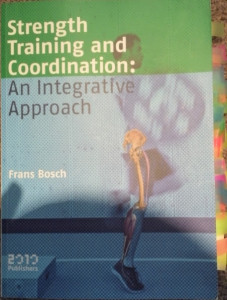
Must read for coaches
Pegasus Descending: James Lee Burke. Crime novel with Detective Robicheaux. Violent story with racial undertones described graphically and emotionally. Page turner.
- Strength Training and Coordination an Integrative Approach: Frans Bosch. Outstanding book on motor learning and strength training. So much detail, clearly written and very applicable. One for experienced coaches of many sports. A must read.
- Bury My Heart at W.H.Smith’s: Brian Aldiss. Excellent book on writing from this sci fi author. Uses autobiographical accounts to highlight points.
- The Glass Rainbow: James Lee Burke. Crime novel with Detective Robicheaux, bit fragmented.
- Essays into Literacy: Frank Smith. 13 essays about reading, language and the differences between how they are learnt and taught.
- Non Stop. Brian Aldiss. His first SF novel about a journey home from outer space. Excellent.
- The Status Seekers: Vance Packard. Sequel to “The Hidden Persuaders”, an analysis o
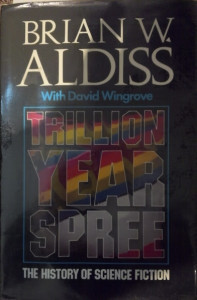 f 1959 USA social, religious, racial and economical society and its “classes”. How much has changed?
f 1959 USA social, religious, racial and economical society and its “classes”. How much has changed? - Trillion Year Spree: Brian Aldiss with David Wingrove. More than just a comprehensive review of Science Fiction up to 1986, it is an historical delight of literary analysis. How I missed this until now, I have no idea. Makes me want to write better and read more.
- Tarzan of the Apes: Edgar Rice Burroughs. Classic yarn, well told.
The best bookshop
I discovered Castle Books in Beaumaris, whilst on holiday. Thousands of books packed into what was effectively someone’s sitting room. Mandy the owner, is like a London cabby, being able to recall books and linked titles from the depths of her mind.
My kids and I got some great books, and still do so by post. Shows the benefit of having random selections rather than just the 23rd of series X in your stocking.
More in depth:
Summary
I read too many factual books early on, together with a few duff recommendations. I have tried to compensate later on in the year with more fiction, and more variety.
Thanks to Hayridge and Devon Libraries for providing many of these books: helpful and cheery staff, makes reading very affordable. They always help my kids too; it is ever more important for real people to discuss real books with my children.
With the unfortunate rise of Decelerated Reading in our county, counting words and chasing numbers has been deemed more important than discovery and escapsim. Reading should never be about competition: by definition, some people will “lose”.
Thanks to Patrick and Rob for sharing as part of our book club.
If you have any recommendations, please leave in comments below. Thanks!
Client Testimonials
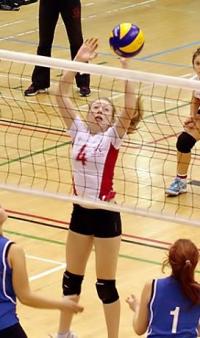 Helen Farr
Helen Farr
The access to expert advice on training and coaching in the STS has been extremely beneficial when guiding Helen (15) through different stages of her physical development. Time is very precious and especially as busy parents of even busier teenagers, we need all the help we can get. As well as following the programme, it has been really useful to dip into certain topics as and when situations occur. Advice on how to prevent and counteract knee problems was certainly helpful when Helen started complaining that ‘her knees were hurting’ directly after competitions.
More


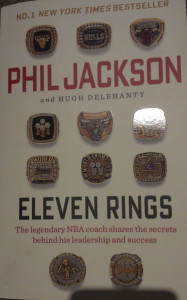
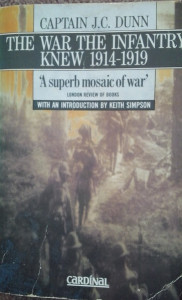
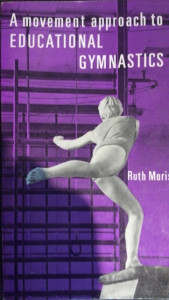
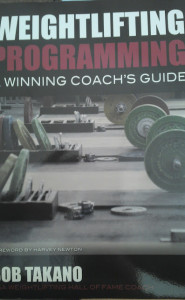
Comments
James,
Very impressive, varied and large book list. I’m now determined to read more myself after being inspired by this list.
Great stuff.
Topsy
Thanks for lending two of them to me Topsy.
Fascinating James. Thank you for sharing. I’m a big fan of Michael Connelly, currently on book 7 of the Bosch series. Earlier ones are easy to pick up in second hand shops for a few pence. The Big Fat Surprise is on my list too. Ben Greenfield has some interesting muses on this theme too once you’ve waded through the Woo Woo science! Changed our eating habits too. Have a good Xmas.
Thanks Carl.The Bosch series goes downhill, authors get as lazy as us readers.